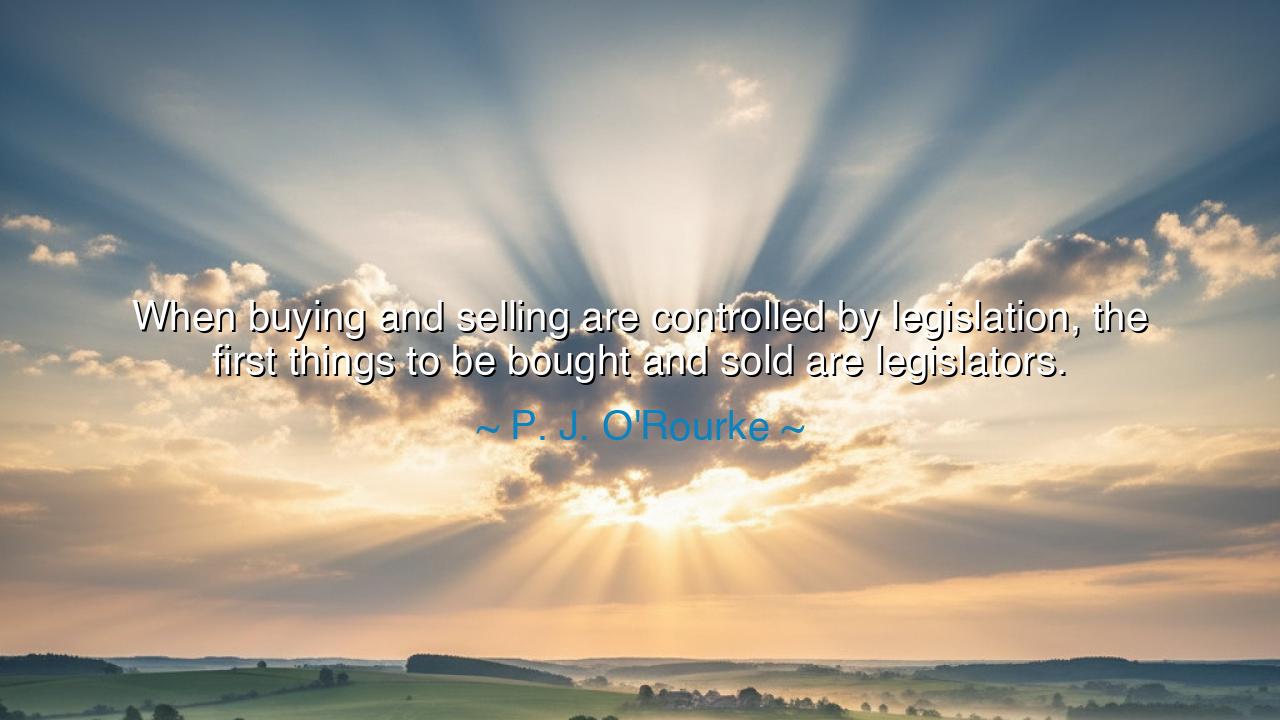
When buying and selling are controlled by legislation, the first
When buying and selling are controlled by legislation, the first things to be bought and sold are legislators.






The words of P. J. O’Rourke — “When buying and selling are controlled by legislation, the first things to be bought and sold are legislators.” — cut with the sharpness of satire but land with the gravity of prophecy. O’Rourke, a master of political humor, warned that whenever the state extends its hand too far into commerce, the temptation for corruption grows. The market for goods soon becomes a market for power itself, where influence is the currency and the legislator becomes the merchandise.
The meaning is stark: laws meant to regulate trade often create opportunities for manipulation, bribery, and favoritism. When legislation decides who may prosper and who must fail, men of wealth and ambition will not stop at competing in the marketplace — they will seek to purchase the makers of law themselves. Thus, the very guardians of justice risk becoming commodities, bartered away in the silent halls of influence.
History bears grim testimony to this truth. In the Gilded Age of America, corporations like the railroads wielded vast power, using bribes to secure favorable laws and crush their rivals. Senators and representatives, entrusted with the people’s welfare, were caught in webs of patronage and payoff. What was supposed to be the defense of fairness became instead the marketplace of corruption. O’Rourke’s words, though humorous in tone, point directly to these dark chapters where legislators were indeed bought and sold.
Nor is this confined to the past. The scandals of lobbying in modern governments — where powerful industries funnel money to politicians to secure favorable votes — reflect the same peril. Whether in agriculture, energy, or finance, when buying and selling are controlled by law, those with wealth seek to shape the law itself. The legislator becomes both gatekeeper and gate-for-sale, and democracy trembles under the weight of hidden transactions.
Let this wisdom be remembered: whenever power decides profit, men will seek to purchase power. Guard, then, the legislator, for he is the ligament between people and law. Without vigilance, his honor may be traded like coin, and the republic will rot from within. O’Rourke’s jest, though playful, stands as a warning to future generations: corruption does not always begin in the market; it begins in the heart of the one who makes the rules of the market. And if the people do not hold their leaders to account, they will soon discover that they themselves have been sold.






CPChi PhuongPro
This quote points to a real issue in many political systems: the potential for lawmakers to become pawns in a larger game of commerce. If we have regulations that should ideally protect us, yet those in power can be bought, then how effective are those regulations in reality? Should we be focusing on reforming the way politicians are funded to ensure that they are truly working for the people and not for personal gain?
TDDang Thi Duong
I find O'Rourke's statement both thought-provoking and concerning. If the people creating laws are themselves susceptible to corruption, then how do we ensure that our system is fair and just? What safeguards can we put in place to prevent lawmakers from becoming part of the problem? Is it even possible to keep politics clean when so much money is involved in the decision-making process?
TKNguyen Hoang Tuan Kiet
This quote really makes me question the effectiveness of government regulations. It implies that once legislators are given control over buying and selling, they’re susceptible to being bought themselves. Does this mean that no matter how well-intentioned legislation might be, it’s always vulnerable to manipulation? How can we build a system where laws protect the public interest without being hijacked by those who are supposed to enforce them?
PLTran Phuong Linh
P. J. O'Rourke’s quote is a sharp critique of the intersection between politics and business. It suggests that when laws govern commerce, they can be manipulated by those in power for personal gain. This makes me think: Does legislation actually serve the public good, or does it merely create opportunities for corruption? How can we ensure that lawmakers are held accountable and not swayed by the influences of those they regulate?